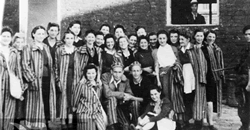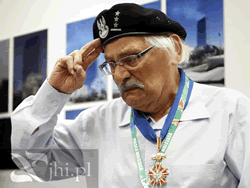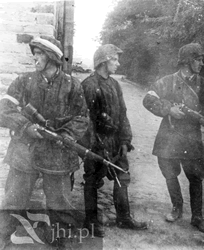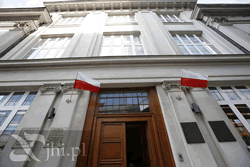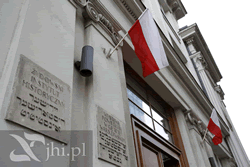http://www.jhi.pl/en/blog/2013-08-01-jews-in-the-warsaw-uprising
JEWS IN THE WARSAW UPRISING
Blog Anniversaries History News The Holocaust
Being part of Armia Ludowa the autonomous platoon of the Jewish Fighting Organisation was the only strictly Jewish fighting formation among the insurgents.
On 1st August, 1944 at 5pm an uprising broke out in Warsaw. Among the fighters were also Jews. Some of them had participated previously in the bloodily suppressed uprising in the Warsaw Ghetto and then in guerrilla fights in the forests. „You do not need to be a psychologist,” wrote about his companions Antek Zuckerman, “to understand what these people felt. I suppose, they had been constantly dreaming of the moment when they would be able to put up a fight against the Germans. And then, came 1st August, 1944 and gave them a chance to fulfil that dream. "
Samuel Willenberg, Hour „W”, 1.08.2013
Zuckerman was appointed commander of the Jewish Fighting Organization after the death of Mordechai Anielewicz in the bunker at 18 Mi?a. Along with Zivia Lubetkin, Marek Edelman, and dozens of other fighters, who in May 1943 managed to escape from the burning ghetto, he immediately joined the next uprising.
Being part of Armia Ludowa (People’s Army) the autonomous platoon of the Jewish Fighting Organisation was the only strictly Jewish fighting formation among the insurgents. However, there were far more Jews among the insurgents. At the time of the uprising, many of them volunteered to the first encountered ranks, ignoring the political connotations of the group. Others had been involved in the activities of the Polish underground for a long time before the uprising.
It is difficult to estimate how many Jews took up arms in August 1944. Most of them fought and perished under Polish names assumed during the war. Their origins were often a mystery also to their fellow fighters. They were afraid, not unreasonably, that if it had come to light, the comrades could start treating them with contempt or they would not allow them to fight at all. It was also possible that at some point a Jewish insurgent could be fired at with a “stray bullet” shot by a comrade.
Insurgents
The attitudes of the soldiers towards the Jews fighting in their ranks were various. Some of the ranks accepted them completely and the fact that they shared the enemy was strengthening the bond. The Jewish insurgents also had different strategies. Samuel Willenberg, soldier of the Polish Army (AK) during the September Campaign as well as a participant in the revolt in Treblinka, while joining the AK “Ruczaj” battalion gave his real name. He did not want to die, as he said after years, as a fictional Ignacy Popow, which then was his name in the documents.
Not only many Jewish men took part in the Warsaw Uprising but also Jewish women. “At 5pm I heard shooting,” wrote Adina Blady-Szwajger, a doctor and ?OB liaison officer, “ I ran out onto the staircase. I will never forget that feeling. A Polish officer was running down the stairs! In a uniform of Carpathian Brigade! Everybody was crying and I was crying with them. In the basement they were making a field hospital. I approached the commander. It was major «Pobóg». I introduced myself and said who I was and I was immediately included in the personnel of the hospital.”
Also children and Jewish youth, similarly to their Polish peers, joined the insurgents’ troops. Known for their bravado were brothers, Zalman „Miki” and Perec „Cwaniak” Hochman. After the liquidation of the ghetto they fought for survival, trading cigarettes at Three Crosses Square. After the outbreak of the uprising they immediately joined the fightings against the Germans. They served as the liaison for operating in ?ródmie?cie district battalion „Sokó?” and they always kept close to the legend of the troops, Anthony Godlewski, aka „Antek Rozpylacz”.
On the streets of uprising Warsaw one could hear languages of many European countries occupied by the Germans: Hungarian, Greek, or French. The Jews transported from their motherlands to O?wi?cim spoke them. Then, they were taken to the Warsaw Concentration Camp, so called G?siówka. Prisoners kept there did cleaning works on the ruins of the former ghetto. On 5th August, Scouting Battalion Zo?ka attacked G?siówka and released 348 Jews being kept there. The majority of them joined the insurgents as well as the fron-line troops.
For the Polish, the Warsaw Uprising was a patriotic uprising that brought destruction to the city. The outbreak of the uprising allowed the last surviving Jews in Warsaw to leave their hiding places and regain their identity. Those who managed to survive the extermination of their own nation, took up arms in order to fight in the Polish troops, looking for a chance to take revenge on the Germans.
„I know that for most of the people, the uprising was a period of the most terrible suffering. But for me it was a period of wonderfully regained freedom „, wrote one year after the war, freed from G?siówka Sophia Samsztejn.
Jewish Historical Institute
